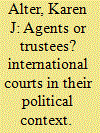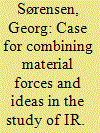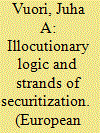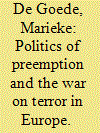|
|
|
Sort Order |
|
|
|
Items / Page
|
|
|
|
|
|
|
| Srl | Item |
| 1 |
ID:
080890


|
|
|
|
|
| Publication |
2008.
|
| Summary/Abstract |
In International Relations applications, theorists employing Principal- Agent (P-A) theory have posited that the fact of delegation defines a relationship between states (collective Principals) and international organizations (Agents) where recontracting threats are the predominant way states influence IOs. Developing a category of delegation to international Trustees, I argue that recontracting tools will be both harder to use and less effective at influencing the Trustees. Trustees are (1) selected because of their personal reputation or professional norms, (2) given independent authority to make decisions according to their best judgment or professional criteria, and (3) empowered to act on behalf of a beneficiary. These three factors account for the different politics between Principals and Trustees, a politics aimed at either keeping issues outside of the domain of the Trustee or at rhetorically engaging the Trustee's authority in an effort to persuade the common `beneficiary' whose loyalty and respect both States and the Trustee seek. In explaining why recontracting threats are not central to Principal-Trustee relations, the analysis bounds the realm in which we might expect P-A theory to apply, and provides a theoretical basis to question the `rational expectations' claim that ICs are tailoring their decisions to reflect the wishes of powerful states and avoid adverse recontracting
|
|
|
|
|
|
|
|
|
|
|
|
|
|
|
|
| 2 |
ID:
080889


|
|
|
|
|
| Publication |
2008.
|
| Summary/Abstract |
Neorealism tends to base itself on a certain, taken-for-granted, view of the material forces in IR, a view which focuses on the relative distribution of capabilities between sovereign states and their consequences in terms of the socialization and competition among states. Social constructivism is preoccupied with the study of ideas, but tends not to question the neorealist view of either socialization or competition or of the material world; the result is that the development and change of how material forces impact with the social world in IR is seriously under-theorized. The present contribution argues in favour of an approach which includes materialist as well as ideational factors; in that sense it advocates `analytical eclecticism'. A rich concept of international structure, which includes materialist as well as ideational factors, is proposed and the consequences of that concept for the analysis of IR are indicated
|
|
|
|
|
|
|
|
|
|
|
|
|
|
|
|
| 3 |
ID:
080892


|
|
|
|
|
| Publication |
2008.
|
| Summary/Abstract |
International norms change over time, but we do not fully understand how and why they evolve as they do. In this article, I explore a general model of international norm change. The model builds on two foundations. First, normative systems themselves generate tensions that lead to change. Those tensions are of two major types: (1) conflicts between the generality of rules and the specificity of concrete experience; and (2) conflicts between separate bodies of rules. Second, specific disputes push these normative conflicts to the fore and provoke arguments about the meaning and application of rules. The outcomes of those arguments necessarily modify the rules. The process of normative change is thus a cycle, linking rules to actions to arguments, which in turn reshape the rules. In order to explore the empirical utility of the model, the article assesses the evolution of the rules of war with respect to the plundering of artistic and cultural treasures. Relying on both secondary and archival materials, the analysis focuses on two crucial turns through the cycle of normative change, the Napoleonic Wars and World War II. The empirical account shows that the cycle of normative change depicted in the abstract does correspond to real-world processes.
|
|
|
|
|
|
|
|
|
|
|
|
|
|
|
|
| 4 |
ID:
080891


|
|
|
|
|
| Publication |
2008.
|
| Summary/Abstract |
Convincing research programmes often use a variety of data from cases in different contexts; in order to reach a wider understanding, the models and hypothesis of securitization studies have to be applied to broad groups of cases. The research programme of securitization studies is formed around the leading idea of securitization being a social process achieved through speech acts. I argue that by explicating the concept of securitization through illocutionary logic, it can be utilized to study security politics in non-democratic contexts in addition to the favoured liberal democratic one, where the majority of empirical analysis has been conducted so far. In addition, I present clarifications to the concepts of 'audiences' and 'special politics' used in the theory. The theoretical discussion is illustrated with examples from the Chinese political system
|
|
|
|
|
|
|
|
|
|
|
|
|
|
|
|
| 5 |
ID:
080894


|
|
|
|
|
| Publication |
2008.
|
| Summary/Abstract |
In the midst of the war on terror and unilateral US security politics, many observers look to Europe for alternatives. It is argued that Europe is particularly opposed to preemptive security practice, and prefers instead to rely on the rule of law. This article examines the meaning of preemption in the war on terror, and analyses three aspects of European counter-terror policy. It becomes clear that, with respect to a number of policies that play a key role in preemptive security practice, including criminalizing terrorist support, data retention, and asset freezing, the European Union is world leader rather than reluctant follower. Instead of relying on images that position Europe as inherently critical of preemptive security, debate concerning the legitimacy and desirability of such practices must be actively fostered within European public space
|
|
|
|
|
|
|
|
|
|
|
|
|
|
|
|
| 6 |
ID:
080893


|
|
|
|
|
| Publication |
2008.
|
| Summary/Abstract |
There is a conceptual gap between causes-of-war research and conflict resolution research. This article introduces a macro-level conceptual framework to facilitate analysis of the outbreak, conduct and resolution of armed conflict within states. Three arguments are advanced, linked to the three questions Why do people start fighting?, Why do people stop fighting? and How can peace be made durable? The first argument is that people take to arms because they have Reasons in the form of grievances and goals, Resources in the form of capabilities and opportunities, and Resolve because they see no alternative to violence in order to address grievances and attain goals. Second, the Triple-R concepts also explain the `outbreak of peace', that is, war termination and peace-building. Third, variations in the dependent variable - different degrees of peace; here termed Triple-M (Mutually Hurting Stalemate, Mutually Enticing Opportunities and Mutually Obtained Rewards) - are explained by changes within those three clusters of explanatory factors
|
|
|
|
|
|
|
|
|
|
|
|
|
|
|
|
|
|
|
|
|